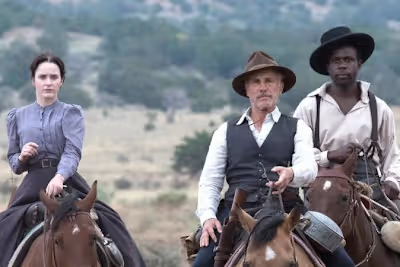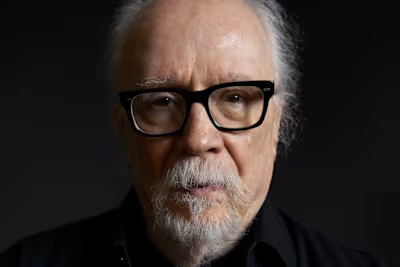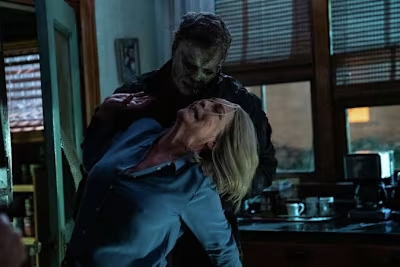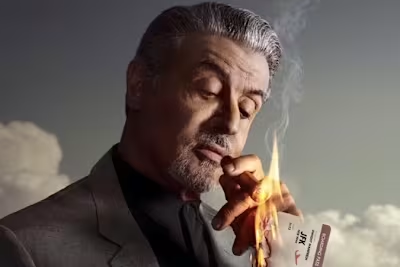The irony and the elegance of ‘The Inspection’
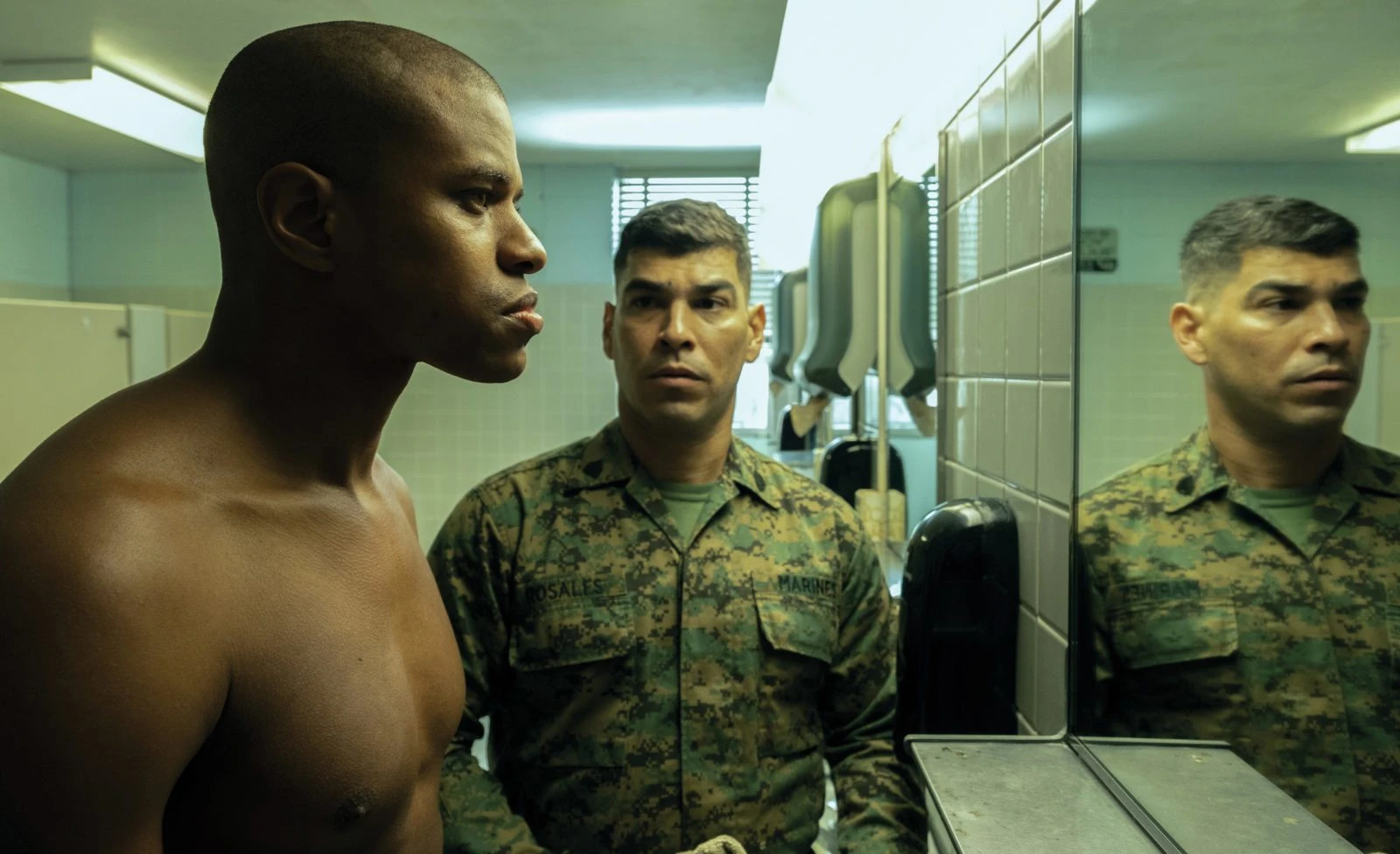
Elegance Bratton’s semi-autobiographical film debut explores chosen families and unpacks his experience serving in the Marines
Elegance Bratton had a singular birth: When the doctors smacked his wet backside, his mother, Inell, says that the baby didn’t cry. He gasped — and looked back at her. “She said it’s the most elegant thing she’d ever seen,” says Bratton. “So she named me Elegance.”
Despite that initial connection, Inell would kick him out of the house at 16 for being gay (and perhaps a touch too elegant). Bratton spent most of the next 10 years with a chosen family at Christopher Street Pier in the West Village. That is, until he entered the Marine Corps.“Black male bodies are expendable, and Black gay men are promised a shortened life span,” says Bratton. “However, when you put that uniform on, all of a sudden we matter.”
The Marine-turned-filmmaker explores that painful understanding in his new movie, “The Inspection.” The story follows Ellis French (played by Jeremy Pope), a stand-in for Bratton, and his experience finding brotherhood and a sense of purpose in the Marines. It’s an irony that’s not lost on the filmmaker.
“The Inspection” appreciates the Marines for the opportunities it affords people like Bratton who can slip through society’s cracks. But the movie isn’t without critiques of society as it relates to the value and purpose of the Black male body in it.
Bratton found his identity early. He calls his identity as a Black queer man “a Frankensteinian assemblage of various glimpses of myself that I’ve caught in media.” Taking from bits of Beyoncé’s choreography, how Karl Lagerfeld uses chopsticks, or Andy Warhol’s affectations, Bratton cobbled together his personality. But he wasn’t a person who society or his own mother celebrated.
It wasn’t until he signed his freedom away to the military that Bratton felt a sense of purpose. Yet the military is a microcosm of the United States: He dealt with homophobia, racism and patriarchy in its ranks. At the same time, Bratton was finally part of a team, a family that couldn’t deny him.
“Every family is dysfunctional, and ‘The Inspection’ is a movie about somebody who’s willing to endure any struggle to win back his mother’s love,” says Bratton. “But also by going through boot camp, he learns how to respect himself.”
Bratton, 43, has made a career of bringing together his experiences in the military and his life at Christopher Street Pier, where countless queer Black youth find community. It was actually in Hawaii where Bratton first used a camera, as a combat cameraperson. When he was re-stationed in 2009 to the Marine Corps recruiting base in Garden City, Long Island, Bratton moved to Brooklyn to take his newfound self-respect and skill with a camera and make a new career.
So far, Bratton’s made a bunch of shorts, the series “My House” for Vice, and the documentary “Pier Kids,” which is about three young transgender New Yorkers who call the Christopher Street Pier home. And this winter, his first feature film (released by A24) is playing in theaters across the country.
He hopes “The Inspection” changes things “a little bit” and makes the Black queer experience more central to the overall queer experience in America and in the world at large. But Bratton understands that the film industry is a business of precedent.
“Hopefully, the success of this film has executives saying, ’I need to get me an Elegance,’” says Bratton. “And they won’t get me unless they pay me a lot.”
We sat down with Bratton to discuss his long road from being homeless to having “The Inspection” play as the closing-night film at this fall’s New York Film Festival.
This interview has been lightly edited.
At the New York Film Festival, you said, “I prayed to God I would leave survival mode and thrive one day, and God allowed it.” When did you receive that new lease on life?I think I’m in a lifelong process of negotiating those feelings. Anyone who’s ever been homeless and gotten out of that situation will tell you, the goal is to never be in that situation again. So the survivor and hustler in me is very much alive and well.
What allowed you to thrive?When I got to the military, I really believed that I was worthless because of my sexuality. I was kicked out of the house at 16 for being gay, which is a really tough way to start one’s adult life. I was fortunate enough to have a drill instructor who told me my life had meaning and value and that I was important. I was enough because I had a responsibility to protect the Marine to my left and to my right. That realization was the beginning of me thriving. I took this purpose I found in the military and applied it in the real world.
When you were kicked out of your house at 16, you found a chosen family at the piers on Christopher Street in the West Village. Do you still consider it home?Yeah, Christopher Street is ground zero for me. I think home is the place where one is most deeply understood. While I’m extremely grateful to be in the position that I’m in as a storyteller, I still feel most understood on Christopher Street Pier. It’s the one place in the world where I can walk down the street and I don’t have to say a word; I’m instantly accepted. People are enthusiastic about my return.
It took eight long years of financial struggle to complete your documentary, “Pier Kids.” Do you think the movie industry wants people to experience that struggle to prove their worth?Unfortunately, I don’t know where my struggle to be a film director begins and my struggle to be fully seen as a Black person in this country ends. What I can say about that eight-year process is that I went to every meaningful institution for support.
I knocked on every door that I could possibly knock on. We’re in a business where people very often assume certain types of movies have a limited audience based on the star of the film and what the film is about. Most folks who are in a position to greenlight films are much more [accustomed] to catering to a market that they know exists, versus discovering new territory.
Basically, people on the business side of the industry thought a documentary about Black, trans, queer homeless kids wouldn’t make a lot of money.“Pier Kids” had a huge hill to overcome for people to believe their story could resonate outside of what many assume is a niche market. It’s show business, right? I think it’s important that people who have not typically had the opportunity to tell stories on this level be allowed to. But those opportunities then have to be met in the market.
What did you take from the experience of making “Pier Kids”?That eight-year process was the gauntlet that I had to go through. But the beautiful thing is, with the support of my creative partner and life partner, Chester Algernal Gordon, we were able to get to the finish line and sell the movie to PBS. Hopefully, our little case study will inspire the gatekeepers of this industry to make it easier for Chester and me, but more importantly, for the next generation of queer storytellers coming up.
You evoked God earlier. What do you believe about God?I believe God is in every person and God is the creative process. God is the creative force. My version of honoring that force is honoring and protecting each person and seeing the humanity in every person, like Ellis French does in “The Inspection.” He does not give up on people. What makes him heroic is the intentionality of his being himself. This isn’t a movie about a gay character who doesn’t know that they’re gay and needs to come out. This is about someone who knows they’re gay and is trying to figure out their place in the world. I think that process becomes more possible when we are focused on what unites us rather than what makes us different. But at the same time, we honor the specificity of our experience. To me, that’s where God comes in. If you do good work with good intentions, the universe will open up the door for you to be celebrated.
Elegance Bratton, Credit: Patti Perret
You lived in Brooklyn when you moved to New York in 2009, and you’ve done a lot of work in the borough.I had an apartment on Dekalb by the G train, and then I lived on Kingston–Throop and all over Bed-Stuy. The funny thing is, I got exposed to filmmaking in the Marine Corps as a combat cameraperson in Hawaii. Then I got a chance to be stationed in New York City and I moved to Brooklyn. In New York, I became a military police officer with the intention of starting my art career outside of the Marine Corps. So Brooklyn is like ground zero for my first instances as an artist. I used military equipment to shoot lookbooks for various designers in Brooklyn. I would shoot events in Brooklyn at the various clubs and eventually started to form community with artists in Brooklyn. By learning how they navigated their careers and opportunities, I was able to come up with my own playbook for myself. Brooklyn was really instrumental and remains an instrumental part of who I am as an artist and as a person. My mother is from Brooklyn; she’s from Bed-Stuy. It’s been a consistent presence in my life from childhood to today.
As a kid, did you have family members in Brooklyn?I had a few cousins that lived in Bed-Stuy and I would visit them. Mind you, this was a very different Bed-Stuy than exists today. A much more working class, much more Black Bed-Stuy than it is now. Though Bed-Stuy is still a very Black part of New York City. I have a lot of memories of going to barbecues in Brooklyn, people’s houses and birthday parties and funerals in Brooklyn, and my mom’s friends’ from Brooklyn. I grew up in Jersey, but I always felt like my mom made a mistake and I should have been born in Brooklyn. [Laughs.] I guess I’ve been mediating that error with my adult life.
“The Inspection” has a fondness for the Marine Corps but also criticizes it. You can’t easily label it pro- or anti-military.For me, this has been a journey to find chosen family, and “The Inspection” is very much an homage and tribute to the power of chosen family. Dovetailing back to one of your first questions about the line between surviving and thriving, I believe that family is where you find it. And the irony of finding my family in a place like the Marine Corps is not lost on me.
So it’s a pro-troop film.This is a pro-troop film, meaning, I identify with folks who are in desperate situations. I know what it’s like to have to use what you got to get what you don’t got. It’s not to say that the movie is free of critique; I think it’s blatantly a critique of the system. But at the end of the day, my critique is with a society that would put someone like me in a position where in order to have the opportunity to live an affirmed, out queer life, I had to make the sacrifice of my personal freedom.
Will you say more about your sacrifices for the Marines?I’m grateful for my opportunity from the Marine Corps, but Black queer lives don’t matter to people until you do something like put on a uniform. Now, all of a sudden, it’s a cultural flashpoint. That truth is itself a critique of the world that we live in. I would much rather put my energy into critiquing a society that has the power to change things through their vote, but doesn’t, than in institutions that are meant to catch those who fall between the cracks.
You’ve called the U.S. military one of the most progressive institutions, noting it integrated in 1948.When I joined the Marines, because the mission is the mission, and although “Don’t Ask, Don’t Tell” homophobia was thick and intense and traumatic for me, at the same time I was finally a part of a team that could not deny me. No matter what they assumed I was doing in my private life, when we showed up to work in those uniforms, you had to make use of me; I had to be included. And that type of inclusion didn’t exist anywhere else in society for me. When I was homeless, I wasn’t offered upwardly mobile jobs.I wasn’t offered career mentorship and training. But when I joined the Marine Corps, I was automatically indoctrinated into a form of meritocracy where I finally had a way to grab onto this ladder and pull myself up.
You pulled yourself up by your bootstraps, so to speak?By no means am I saying the solution for every queer person is to pull themselves up by their bootstraps. But what I will say is that all I had were my bootstraps! [Laughs.] I didn’t have nothing else to pull myself up with, and I’m grateful for the opportunity. I’m grateful for the access to be able to transform my life. And that doesn’t mean I’m not critical. But that gratitude overwhelms any sense of injustice because in actuality, all I was ever promised outside of uniform was injustice. At least when I was in uniform, there was a little light at the end of the tunnel to where I could transform my life.
Will you tell me about one of our queer veterans we should know?Oh, my gosh, wow, what a question. Paul Popham was discharged in the 1960s, and he was one of the founders of the Gay Men’s Health Crisis in New York during the AIDS epidemic. He was a U.S. Army veteran and was very much instrumental in the fight against the first appearances of HIV and AIDS.
Talk about the effect “Don’t Ask, Don’t Tell” had on service members.“Don’t Ask, Don’t Tell” may have gotten its name in the ’90s, but career service members were first forced to serve in silence for almost 80 years. My film is an homage and honor to every person who’s ever been kicked out of the Marine Corps and out of the military for being queer. It really is turning a spotlight back on the military. I was able to survive that gauntlet of essentially hiding oneself in plain sight, and I ended up in this position, but there are so many hundreds of others who didn’t have the luck that I did and were processed out. Hopefully, it’ll start some sort of movement or conversation about the massive loss of potential that occurred because people were kicked out for being gay. How many more people like me could there have been if this policy wasn’t in place?
Like this project
Posted Sep 22, 2023
Elegance Bratton’s semi-autobiographical film debut explores chosen families and unpacks his experience serving in the Marines.
Likes
0
Views
25


